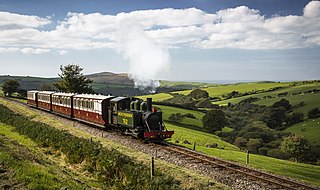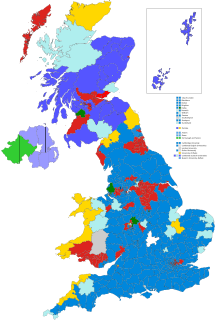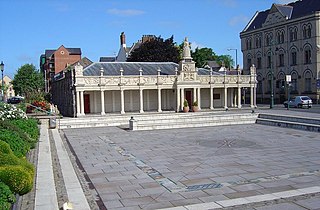Related Research Articles

Barnstaple is a river-port town in North Devon, England, at the River Taw's lowest crossing point before the Bristol Channel. From the 14th century, it was licensed to export wool and won great wealth. Later it imported Irish wool, but its harbour silted up and other trades developed such as shipbuilding, foundries and sawmills. A Victorian market building survives, with a high glass and timber roof on iron columns. The parish population was 24,033 at the 2011 census, and that of the built-up area 32,411 in 2018. The town area with nearby settlements such as Bishop's Tawton, Fremington and Landkey, had a 2020 population of 46,619.

The Lynton & Barnstaple Railway (L&B) opened as an independent railway in May 1898. It was a single track, 1 ft 11+1⁄2 in narrow gauge railway and was slightly over 19 miles (31 km) long running through the rugged and picturesque area bordering Exmoor in North Devon, England. Although opened after the 1896 Light Railways Act came into force, it was authorised and constructed prior to that act. Therefore, as with all other railways, it was authorised under its own Act of Parliament and built to higher standards than similar railways of the time. In the United Kingdom it was notable as being the only narrow gauge line required to use main-line standard signalling. For a short period the line earned a modest return for shareholders, but for most of its life the L&B made a loss. In 1923 the L&B was taken over by the Southern Railway, and eventually closed in September 1935.

Barnstaple was a constituency centred on the town of Barnstaple in Devon, in the South West of England. It returned two Members of Parliament to the House of Commons of the Parliament of the United Kingdom until 1885, thereafter, one.

Barnstaple Castle stood near what is now the centre of the town of Barnstaple, Devon. When it was built, it was on the western side of the fortified town and commanded a good view of both the town and its important river crossings. The castle was built on top of an early medieval cemetery.

Sir Ernest Joseph Soares, of 36 Princes Gate, London, and of Upcott House in the parish of Pilton, near Barnstaple in North Devon, was a British solicitor and Liberal politician.
William de Auco was Archdeacon of Barnstaple until 1155.
Roger was the fourth Archdeacon of Barnstaple.
Thomas was Archdeacon of Barnstaple until 1203.
John was the seventh Archdeacon of Barnstaple, England.
Thomas de Hertford was Archdeacon of Barnstaple until 1271 and also Archdeacon of Totnes from 1270 to 1275.
Philip of Exon was Archdeacon of Barnstaple until 1279.
Ralph Germeyn was Archdeacon of Barnstaple until 1308.
John Pollard was a 16th-century Archdeacon of Wiltshire, Archdeacon of Cornwall, Archdeacon of Barnstaple and Archdeacon of Totnes.
Henry Squire was Archdeacon of Barnstaple from 1554 to 1582.
Robert Lawe was Archdeacon of Barnstaple from 1582 to 1585.
John Bull was Archdeacon of Cornwall, then Barnstaple in the first half of the nineteenth century.
Lewis Stephens was Archdeacon of Barnstaple and Archdeacon of Chester.
Ralph was an Archdeacon of Barnstaple during the early part of the Thirteenth century.

Queen Anne's Walk is a grade I listed building in the town of Barnstaple, North Devon, completed in 1713 as a meeting place for the town's merchants. It is believed to have been designed by the architect William Talman, on the basis of its similarity to his work at the Hall in Drayton, Northamptonshire. It was promoted and financed by the thirteen members of the Corporation of Barnstaple whose armorials are sculpted on and above the parapet, and the work was overseen by Robert Incledon (1676–1758), Mayor of Barnstaple in 1712–13. It has been owned for many decades by North Devon District Council, which currently (2014) leases it to Barnstaple Town Council, and now trades as The Cafe on the Strand.

Thomas Johnes, MA was a Welsh cleric of the Church of England, Archdeacon of Barnstaple from 1807 to 1826.
